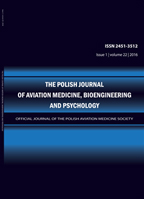2016, Volume 22, Issue 2
Long-Term Health Effects Ejection from Aircraft in Military Pilots
Tomasz KOZICKI1
-------------------------------------------------------------------------------------------------
1Military Institute of Aviation Medicine
Autor korenspondencyjny: Tomasz KOZICKI; Military Institute of Aviation Medicine; email: tkozicki[at]wiml.waw.pl
Full text
Streszczenie
Introduction: In military aviation, pilots have to perform complex tasks under variable environmental conditions, at different times of the day, during complex military missions; this can cause emergency events. Such emergency events may necessitate emergency ejection. However, because of deficits of time and attention as well as because of difficult conditions of ejection, pilots often have inadequate positions before ejection. This can lead to various bodily injuries, leading further to acute and long-term consequences for the pilots’ psychophysical state. The main aim of the study was to analyze injuries related to emergency ejection in military pilots and to evaluate potential long-term health consequences of emergency ejection.
Methods: We included all pilots of the Polish Air Force who performed successful emergency ejections between 1985 and 2007. In this period, 36 pilots performed emergency ejections, including one pilots who had two ejections. We analyzed the gathered data with respect to medical and legal aspects.
Results: We put forward the three following hypotheses: 1) emergency ejections have a negative impact on pilots’ health; 2) the health condition of pilots is getting worse with an increasing number of flight hours; 3) the health condition of pilots is getting worse with increasing age.
Discussion: Despite the advancement of aviation technologies, it is impossible to avoid all emergency situations that can lead to emergency ejections. The increasing role played by new technical and informational solutions limits the role of human factor in the process of ejection, which remains the major cause of aviation disasters. A number of solutions applied in the construction of the ejection seats are in place to reduce the risk of death and injuries. Aviation health care analyzes every case of emergency ejection with regard to its health consequences to the pilot, mechanisms of injury, effectiveness of emergency systems, hospital procedures and the scheme of action for medicolegal personnel who decides on the fate of the pilot.
Conclusion: Based on the investigations, we report the following findings:
- mild injuries incurred during ejection or injuries that were not recognized within several hours after ejection resulted in pilots being unfit for military service in the long-term,
- severe injuries with accompanying psychological disorders led immediately to discontinuation of military service,
- moderate injuries of the vertebral column in the long-term caused pain syndromes related to overload,
- subjective evaluation of pilots’ own health after ejection was related to the degree of injury and pain.
Słowa kluczowe
emergency event, emergency ejection, health effects, deficits of time, inadequate positions, pilots psychophysical state
